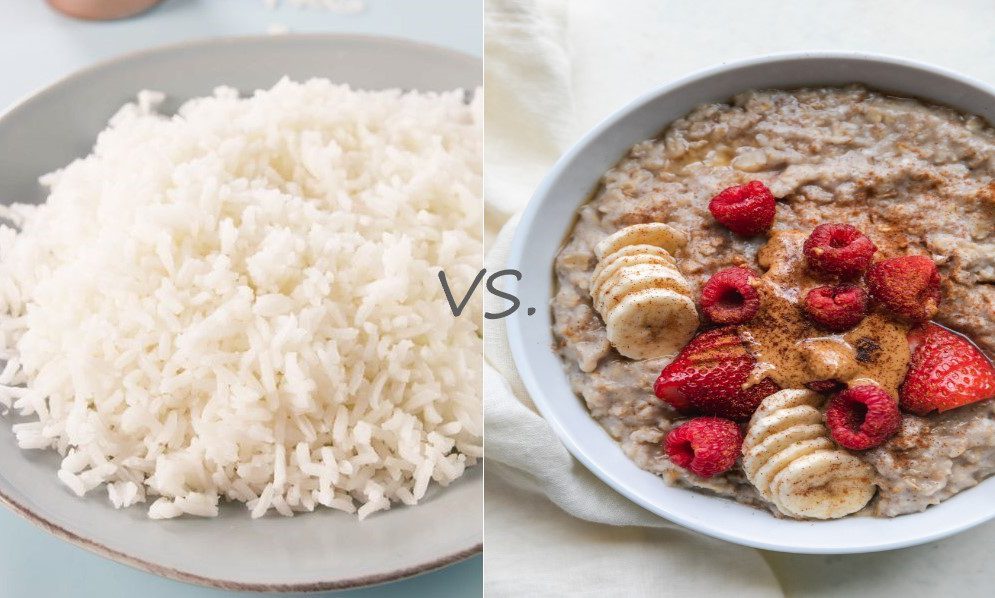
For the last couple of weeks, I’ve been getting the question about what carbs are better and why and I always try it to explain in the simplest terms as I can so they will be able to understand.
“Why white rice post-workout? Isn’t that gonna make me fat?”
“Why oatmeal post-workout? Don’t you need something faster to digest instead?”
“What carbs should I eat post-workout?”
First of all, let’s also talk about pre-workout nutrition and what is better for your goals.
We should all now that eating the right foods before a workout makes all the difference. The idea of pre-workout nutrition is to fuel your body properly to perform at maximum intensity and prepare your muscles for growth.
A pre-workout meal should increase glycogen levels, with glycogen being the stored form of carbohydrates in your body used as the predominant fuel source for long periods of exercise, and prevent catabolism, which simply put is when the body breaks down muscle tissue to use as energy.
A pre-workout meal should contain protein, which helps prevent catabolism, some carbs for energy, and fats to provide a slow-burning fuel for longer sessions.
Regarding the carbs, you want to analyze first and foremost how long your workout is going to last. If it’s a short workout, then simple and fast-digesting carbs (white rice for example) is a great choice since it gives you a quick burst of energy. On the other hand, if it’s a longer workout, more complex or slow-digesting carbs (like brown rice, quinoa, wheat bread) are the best choice for more lasting energy.
Regarding mid-workout nutrition, it doesn’t make too much sense because your body would be spending energy in digesting the food you took while it should be focusing on and using that energy on the workout.
That being said, you definitely burn fuel during intense workouts, especially during heavy training sessions where your body uses plenty of carbs, which are broken down into glycogen.
By taking a mid-workout shake composed of fast-digesting protein and carbs helps spare glycogen, and also decreases catabolism by providing a steady source of amino acids.
A proper pre-workout nutrition plan can take care of all of this. By timing the pre-workout meal appropriately, you should already have these essential macronutrients for growth entering your bloodstream when you walk into the gym, ready to feed those hungry muscles. If this is the case, then all you need during your session is water.
Now it’s time for the topic of interest, but even though I get questions mostly regarding post-workout, pre & mid-workout nutrition should be of your interest too if you’re really looking to improve your workouts and maximize results.
Hence, we’ll jump right into post-workout nutrition.
If you don’t eat the right foods after training, or you don’t eat them at the right time, your performance the next time will suffer, your gains will not be as good as they could be, and you could end up losing mass along the way.
The most important reason to eat something after you work out is to trigger an insulin response. This is a highly anabolic hormone. Spiking stops protein breakdown and helps encourage protein synthesis.
If you are going to implement a solid or liquid meal immediately after an intense training session, as opposed to pre-workout nutrition where complex carbohydrates are preferred, your carbs here should be simple and easy to digest in order to provoke an insulin response to build muscle, avoid soreness, and recover quicker.
The goal of here is to replenish glycogen levels and give your body what it needs to recover.
Carbohydrates alone can accomplish the first goal, but the response is greater when you consume carbs and protein together. No, it doesn’t have to be right after you finish in the so-called “anabolic window,”. But it doesn’t hurt to have it right after a workout. Why? The sooner you get that shakedown, the sooner it can do its work, and the sooner you can eat again.
Now, let’s call that the “immediate-post-workout” meal. So the time for your actual post-workout meal shouldn’t be any longer than 1-2 hours after you work out; unless you haven’t consumed your “immediate-post-workout-meal after your workout; which in that case you should get your meal no longer than 30-45 minutes after you finished training.
Now, should you consume simple (or fast-digesting) or complex (or slow-digesting) carbs in your post-workout meal? It depends on whether you’d like to take advantage of the insulin spike caused by the workout, or stabilize blood sugar and prevent unwanted fat gain.
Why am I talking about fat gain here? Well, because insulin is as much a fat-storing hormone as it is an anabolic hormone. So if you want to avoid gaining extra body fat while you build mass, it makes sense to keep your blood sugar levels stable after you train and not spike them.
Bottom line, it all depends on your goals. If you’re trying to lose fat a.k.a. “cutting”, the best advice would be to consume a complex carbohydrate source such as oatmeal. And if you’re trying to put gain some muscle a.k.a. “bulking”, then any fast-digesting carbohydrate source like white rice is perfect for your post-workout meal!



